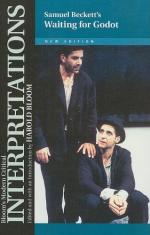|
This section contains 2,244 words (approx. 8 pages at 300 words per page) |

|
[In] contrast to the progression of Joyce's oeuvre, where each new work appeared more exhaustive and revolutionary than its predecessors, Beckett came to offer a modern regression. His career, as it developed, actually seemed to reverse the traditional picture of artistic development. Each new work of Beckett's shrank in length; minimal plot, social setting and characterization became yet more minimal. The logical point of termination began to look like silence, the pure blank page. This was the meaning of Beckett for many in the 1960s. But from the viewpoint of 1970s the perspective is quite different. The myth of regression has collapsed. In retrospect we can see how the apparent dead-ends of Beckett's career are simply staging posts for new ventures. We now get an image of the writer as a free man making artistic decisions, rather than as a metaphysician trapped in the coils of an immutable...
|
This section contains 2,244 words (approx. 8 pages at 300 words per page) |

|


